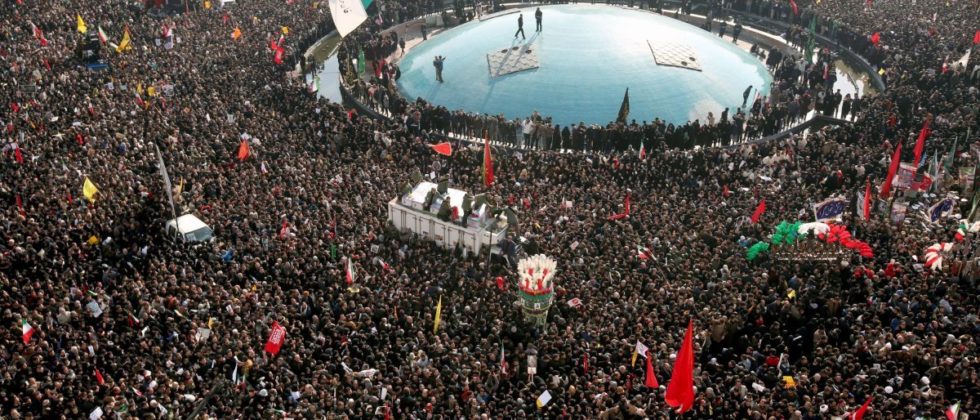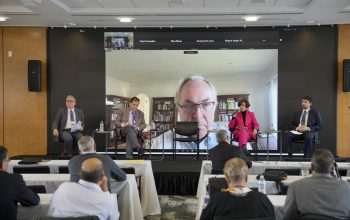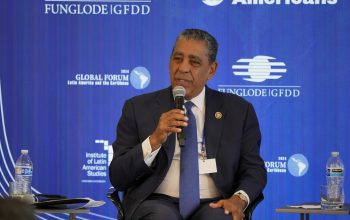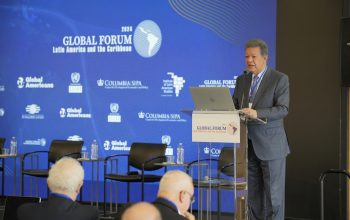news
“The United States and Iran: Unsustainable Peace and The Unlikely War”, an article by Dr. Leonel Fernández
January 23, 2020
Following the surprising physical elimination of General Qassim Suleimani, Iran’s main military strategist, by order of President Trump’s government, the world experienced a jolt and was engulfed in its uncertainty.
The world awaited a reaction of the Iranian government.
Hundreds of thousands of people took to the streets following the casket that transported the remains of Suleimani, a national hero, under banners reading “Death to America.”
The Ayatollah Ali Khamenei, the senior spiritual leader of Iran, vigorously cautioned there would be retribution.
However, all of this apparently fizzled out.
Several dozens of rockets were launched from Iran to military bases in Iraq where there are North American troops. In anticipation, Iraqi authorities were notified to avoid casualties.
Considering this situation, President Trump, who initially shared an incendiary and menacing rhetoric, lowered the tone of his words to avoid the escalation of the conflict.
For the United States, the assassination of General Qassim Suleimani was something that had been previously contemplated. He was considered the architect of the principal armed conflicts that generate in the Middle East, at the expense of American interests and the interests of its allies, amongst them Saudi Arabia and Israel.
Nevertheless, the governments of Presidents George W. Bush and Barack Obama had dismissed this move, considering it of high risk.
They considered that it would be interpreted as a provocation of Iran, which could give way to an escalation of conflicts in a region already affected by a chronic political instability.
ISLAMIC REVOLUTION
Tensions between the United States and Iran did not arise out of the recent events that have the world in suspense. Its origins go back to the triumph of the Islamic Revolution led by Ayatollah Khomeini in 1979.
Following the triumph of this revolution, which put an end to the monarchic dynasty of Shah Reza Phalevi, a new stage of history began towards the formation of a theocratic state in which Islam was transformed from religion to a political tool.
Under the government of President Jimmy Carter, the new regime conflicted with the United States from its very beginning. The North American embassy in Tehran was occupied by Iranian demonstrators who took North American diplomats as hostages for more than a year.
The new Iranian authorities tried to spread Shiite Islam to the rest of the neighboring Muslim countries. War with Saddam Hussein’s Iraq unfolded and would last practically throughout the 1980s.
After this armed conflict and the death of the historic leader of the revolution, Ayatollah Khomeini, the internal and external politics of Iran, or ancient Persia, has been influenced by falcons, hard line sectors, and pigeons, or moderate groups.
Something similar has occurred in the North American side.
While the Democrats of the White House or Congress has tried to maneuver its relations with the Islamic Republic through diplomatic channels, Republicans, on the contrary, have always preferred confrontation.
For example, during the period of Mahmoud Ahmadinejad’s government, a falcon, a conflictive situation developed with the United States, Europe, and Israel, due to his move to develop a radical nationalism politic which claimed its right for Iran to develop nuclear technology.
Furthermore, these countries accused Iran of supporting armed groups such as Hezbollah, that operated in the south of Lebanon, and Hamas, which operated in Gaza as the armed wing of the Palestinian group in that region.
Radical leader Ahmadinejad was substituted in 2006 by the moderate Hassan Rouhani. He preferred to negotiate with the international community the limits of the exercising rights of enriching uranium and developing nuclear technologies instead of claiming that right.
And so, it was done, with cooperation from France, the United Kingdon, China, Russia, and Germany. Under the government of Barack Obama an accord was signed that would eliminate the possibility of developing nuclear weapons.
TRUMP ERA
The adoption of an agreement between Iran and the United States not to develop nuclear weapons and lift sanctions that were imposed on Iran in response to its previous stance spread a message of calm and tranquility around the world.
However, the United States Congress and its republican majority and Israel’s government under Prime Minister Benjamin Netanyahu manifested their opposition to the agreement claiming it did not offer sufficient guarantees of fulfillment.
The International Agency of Atomic Energy of the United Nations came to certify the fulfillment of Iranian authorities. Despite this, when arriving at the White House, President Trump assumed the criteria of the legislators of his party to implement the revocation of the accord and establish new economic sanctions on Iran.
Over the past three years, meaning under the Trump administration, that has been the relationship between the United States and Iran: one of tension, conflict and distrust.
Towards the end of December of last year, a paramilitary Iraqi group, backed by Iran, launched more than 30 rockets at an Iraqi military base where a North American contractor died.
In response, the United States rushed forward with airstrikes targeted at the bases of these military groups, causing the death of 24 people in Iraq and Syria.
In turn, these exchanges provoked a protest at the U.S. embassy in Iraq on New Year’s Eve. Fires were set in the compound which raised alarms in Washington.
The idea was that the events of Tehran in 1979 were not to be repeated, not the events of Benghazi in Libya which resulted in the death of the U.S. ambassador.
Alleging that General Suleimani had not only been the principal instigator of the political instability in the Middle East but also was the bearer of new war plans in the region, President Trump and his government opted to eliminate him without notifying Congress beforehand and without taking into consideration the sovereignty of the Iraqi state.
Tensions between the United States, a global power, and Iran, a regional power, put at risk the stability and security of the entire Middle East. For this reason, in light of recent events, the world is waiting.
It expected a war that seems it is not going produce. But neither can it expect a peace that does not seem sustainable.






